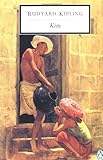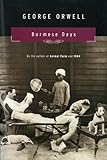 I avoided reading Kim for a long time because I’ve always thought of it as some creaking colonial bore, popular with dads (or my dad, rather. Who is not, for the record, a creaking colonial bore). Kipling, I have observed, is catnip to gentlemen over a certain age; how far they are over that age determines how much they own up to his allure. Kipling is also high on what I will call the Post-Colonial Burn Index (higher than Conrad, lower than Haggard). These are the authors who look particularly dingy in the bright(ish) light of progress. While authors high on this index retain value within Academia and among the Olds, their stock with the Youngs and the read-for-fun set is at an ebb. I guess it’s like that for most hundred year-old books, regardless of reputation. Either way, I approached Kim expecting little.
I avoided reading Kim for a long time because I’ve always thought of it as some creaking colonial bore, popular with dads (or my dad, rather. Who is not, for the record, a creaking colonial bore). Kipling, I have observed, is catnip to gentlemen over a certain age; how far they are over that age determines how much they own up to his allure. Kipling is also high on what I will call the Post-Colonial Burn Index (higher than Conrad, lower than Haggard). These are the authors who look particularly dingy in the bright(ish) light of progress. While authors high on this index retain value within Academia and among the Olds, their stock with the Youngs and the read-for-fun set is at an ebb. I guess it’s like that for most hundred year-old books, regardless of reputation. Either way, I approached Kim expecting little.
I came away from Kim surprised on two fronts. First, I was surprised to find that I was actually reading, for the second time this month, a John le Carre novel. It was all there; the story of an orphaned sahib, long on brains and short on pedigree, fostered from a tender age by the everloving arms of the Service, all in the name of thwarting the Russians. The Russians, it seems, are a perennial problem. In fact, Kim gave me a greater appreciation for John le Carre, who cleverly channels and complicates Kipling throughout his own work. Among other things, he charges right into the impossibility, which Kipling prods at without really engaging, of being wholly part of two worlds.
Then, I was surprised that I enjoyed reading the novel. It laid on the White Man’s Burden less thick than I expected. Of course it’s there; it’s the crux of the story. But I thought the novel was going to be a mouth-breathing white man in a topee. Instead, like Kim himself, it’s a lissome kid in salwar kameez. It lulls you into thinking you are simply reading a charming buddy road novel, or turning the pages of a sepia-toned viewbook. You’re skipping school, mixing it up, hustling, but with heart.
 Of course, it happens not to be that simple. Kipling clearly had a deep, abiding affection for and interest in the landscape, people, customs, and cultural complexities of his erstwhile homeland, and it is felt profoundly throughout this novel. Still, comfortably coexisting with this sentiment was the firm conviction that England was the legitimate shepherd of the Subcontinental flock. George Orwell, who went back and forth in his estimation of Kipling (he called him a “jingo imperialist…morally insensitive and aesthetically disgusting,” but he granted him a place in the literary-historical pantheon) knew this apparent paradox well. In Burmese Days,
Of course, it happens not to be that simple. Kipling clearly had a deep, abiding affection for and interest in the landscape, people, customs, and cultural complexities of his erstwhile homeland, and it is felt profoundly throughout this novel. Still, comfortably coexisting with this sentiment was the firm conviction that England was the legitimate shepherd of the Subcontinental flock. George Orwell, who went back and forth in his estimation of Kipling (he called him a “jingo imperialist…morally insensitive and aesthetically disgusting,” but he granted him a place in the literary-historical pantheon) knew this apparent paradox well. In Burmese Days,
Mr Macgregor stiffened at the word ‘nigger’, which is discountenanced in India. He had no prejudice against Orientals; indeed, he was deeply fond of them. Provided they were given no freedom he thought them the most charming people alive. It always pained him to see them wantonly insulted.
‘Is it quite playing the game,’ he said stiffly, ‘to call these people niggers–a term they very naturally resent–when they are obviously nothing of the kind? The Burmese are Mongolians, the Indians are Aryans or Dravidians, and all of them are quite distinct–‘
Kipling, although probably not much like the ineffectual Magregor, shares his barbed affection for the colonized. His character Kim, the “friend of all the world,” is a Mary Sue. He’s good at everything–languages, friendship, cursing, disguises (skirts, even). He can mix with sahibs, Pathans, Bengalis, Tibetan lamas, and everyone else. Basically, he is the most awesome guy ever. And, like, not only can he do all the things that various brown people can do, but he’s secretly white! It does not get more awesome than that.
The best use of Kim’s genius for cross-cultural passing, Kipling tells us with no trace of irony, is a role as a spy in the Great Game, toward the continued Dominion of the British Empire (and, naturally, the subjugation of her subjects). The novel reflects the most insidious kind of prejudice–the kind woven into a love song. Consider the print and hot air devoted quite sincerely to the beauty, the superior heart, the emotional intelligence of women–written and spoken, to a word, by people who thought women were too stupid to vote. That’s kind of the situation here.
Sorting through my impressions when I finished the novel, I find there is something weird about the whole thing. For one, the story is so wistful and idealized that it reads more like a fairy tale than the jewel in the crown of a Nobel laureate. I feel Kipling in that I fantasize about being a Kim, being able to fit in and speak without an accent. I’m a foreign service brat, from a contingent whose central paradox is that they feel homesick for places they don’t understand and languages they can’t speak.
The desire with which Kipling wants to be Kim seems palpable to me, and ludicrous, considering Kim’s impossible awesomeness. He’s the Whole Boy: Indian Edition. In fact, Kim is so awesome that I spent the last quarter of the book convinced that he was about to die, like whatsername in Little Women.
But he doesn’t die. In fact, I’m not quite sure what he does, despite reading an essay literally entitled “What Happens at the End of Kim?” Kim’s buddy, the holy man, attains nirvana, but turns back, like one does, to take his apprentice along. Kim is already bound to a life of international intrigue, though, so I’m pretty sure he can’t come. It’s sort of win-win either way for him, I thought, although I’m not sure about the lama. Maybe there’s something here I’m not grasping.
Ultimately, I suppose the book is a jewel. For all that it is founded on the paradox of prejudice and a shaky plot, the story sparkles. It’s just that it sparkles from a tarnished crown in a pawnshop window, a relic from a discredited raj.









